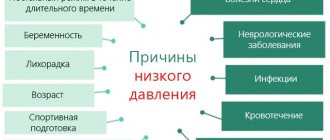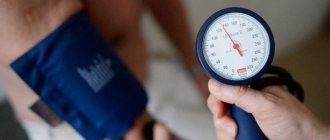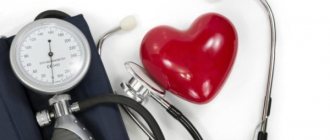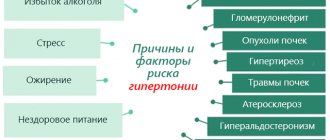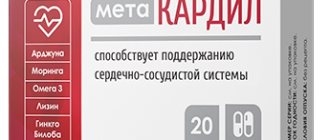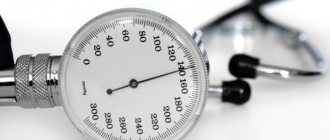Blood pressure of 180 over 100 is a clinical symptom characteristic of hypertension occurring in the third stage. If such high levels remain for a long time, a number of irreversible changes occur in the patient’s body, fraught with such dangerous consequences as heart attacks and strokes. Stage 3 hypertension requires competent, timely treatment. Otherwise, there is a high probability of disability, loss of ability to work, and even death of the patient.
What do the numbers 180/100 mean?
Ideally, blood pressure (BP) in a healthy person should be 120/80 mmHg. Minor deviations are considered one of the acceptable variants of the norm. Constantly elevated blood pressure of 180/100 indicates a progressive, severe form of hypertension. A person needs to take emergency measures to stabilize his condition in order to prevent a hypertensive crisis, and then seek help from a qualified specialist
Such a sharp jump in blood pressure is usually accompanied by characteristic symptoms:
- Headache;
- Edema;
- Rapid heartbeat;
- Weakness, malaise;
- Tremors,
- Hyperemia of the skin;
- Heart rhythm disturbances.
Blood pressure 180/100 is a pathological condition that requires urgent medical intervention and a competent, comprehensive therapeutic course aimed at treating hypertension.
A reading of 180 to 100 is a serious symptom that requires immediate help.
What is the danger
The majority of hypertensive patients have an increase in blood pressure to 180/90 mm Hg. Art. indicates the development of a hypertensive crisis. Doctors also tend to consider this indicator as a sign of a pre-stroke condition.
Important! The exception to the rule is the so-called “working” hypertension. With such a course, the disease does not cause unpleasant sensations in a person and damage to internal organs typical for hypertension.
A hypertensive crisis has several characteristic features:
- the condition most often occurs in women - according to medical statistics, 1.5 times more often than in men;
- the duration of the attack is variable - it can last from several hours to several days;
- a hypertensive crisis is prone to recurrence - having happened once, it will certainly happen again;
- in case of failure to provide adequate medical care, death cannot be ruled out;
- A hypertensive crisis always occurs against the background of severe hypertension.
Treatment of hypertensive crisis is carried out inpatiently with the mandatory use of medications.
No ads 1
Why do blood pressure levels increase?
Medical experts identify the following, the most common causes of pressure 180 to 100:
- Genetic predisposition:
- Improperly balanced diet, abuse of fatty, fried, salty foods;
- Frequent stressful situations and psycho-emotional shocks;
- Insufficient physical activity;
- Excess body weight;
- Smoking, drinking alcohol;
- Chronic lack of sleep;
- Excessive, regular physical, mental, emotional stress;
- Hormonal disorders.
The age factor, as well as a person’s gender, also matters. According to statistics, people over 40 years of age are most susceptible to arterial hypertension. Hypertension in men usually develops at a younger age.
If a person’s blood pressure remains stable at 180 over 100 over a long period of time, this may be a clinical sign of the following pathologies:
- Intestinal disorders;
- Diabetes;
- Encephalopathy;
- Diseases of a cardiac nature;
- Vegetovascular dystonia;
- Renal dysfunction;
- Increased pressure on internal organs localized in the pelvic area;
- Pyelonephritis;
- Endocrine pathologies;
- Severe kidney diseases;
- Disruption of the blood supply to the arms and legs.
Diabetes mellitus is a risk factor for the development of hypertension
For representatives of the fair sex, increased blood pressure is possible during pregnancy, breastfeeding, and at the onset of menopause, due to sudden changes in hormonal levels.
If the patient has already been treated for hypertension and his blood pressure has risen to 180/100, the doctor should be informed about this in order to correct the treatment course, select other antihypertensive medications, or increase the dosage of the medications taken.
Causes
Factors causing an increase in blood pressure to 180/90 mmHg. Art., are quite numerous. The list of main reasons includes:
- Regular stressful situations. This is one of the leading factors causing the development of hypertension. During the period of emotional outburst, a huge amount of adrenaline is released into the blood. The hormone causes a sharp jump in blood pressure immediately to high levels.
- Poor nutrition. Abuse of fatty, fried, smoked foods causes the development of liver problems. Such nutrition also negatively affects the functioning of other organs. The result is an increase in the volume of “bad” cholesterol, the formation of plaques on the walls of blood vessels and, as a result, a narrowing of their lumens, a persistent increase in blood pressure.
- Insufficient consumption of clean water. Juices, carbonated drinks, and teas cause red blood cells to stick together. As a result, it becomes thicker. Lack of clean water is one of the main causes of hypertension.
- Abuse of salt. Sodium chloride causes fluid retention in the body and also promotes the active excretion of magnesium and potassium. These elements are necessary for the full functioning of the cardiovascular system. That is why, when diagnosing hypertension, it is necessary to limit salt intake to 5 g per day. It is also necessary to take into account the salt contained in prepared foods.
- Overweight. Obesity causes disruption in the functioning of all organs and systems. Numerous cholesterol plaques form in the vessels, blood flow becomes more complicated, and the heart is forced to work under strain. As a result, hypertension develops and blood pressure rises to high levels.
- Diabetes. Insulin is a hormone responsible not only for the absorption of glucose. It also has vasodilating properties. In diabetics, this hormone is either completely absent or invisible to the body. As a result, almost all patients suffer from severe hypertension with frequent crises.
- Predisposition at the genetic level. The tendency to hypertension can be inherited, and over the years transform into hypertension.
- Bad habits. Alcoholism and nicotine addiction negatively affect the condition of blood vessels. That is why hypertension is diagnosed especially often in alcoholics and long-term smokers.
- Maintaining a sedentary lifestyle. Insufficient physical activity is one of the causes of hypertension.
- Chronic diseases. Pathologies accompanied by fluid retention in the body are traditionally accompanied by an increase in blood pressure. In such cases, the pathology is a complication of the underlying disease.
Obesity is often accompanied by severe hypertension
Symptoms
Hypertension, which occurs in an advanced and severe form, manifests itself with pronounced clinical signs, noticeable even to a person not related to medicine.
General symptoms
Indicators of 180 to 100 are accompanied by the following characteristic symptoms of high blood pressure:
- Tachycardia;
- Attacks of severe dizziness;
- Sensation of pulsation in blood vessels;
- Spots, spots and dots flashing before the eyes;
- Swelling localized under the eyes;
- Feeling of noise and ringing in the ears.
- The person complains of increased fatigue, drowsiness, and becomes nervous and irritable.
Signs of a hypertensive crisis
Hypertensive crisis is a pathological condition that occurs with a sharp increase in blood pressure to 180 to 100 or more, manifested by the following alarming clinical signs:
- Impaired coordination of movements;
- Pronounced pain syndrome localized in the back of the head;
- Nausea and vomiting;
- Painful sensations localized in the heart and chest;
- Decreased sensitivity of the fingers of the upper and lower extremities;
- Redness and swelling of the skin of the face;
- Visual impairment;
- Pulsating sensations in the head;
- Frivolous state;
- Deterioration of hearing function.
A severe form of hypertensive crisis may be accompanied by convulsions, coughing up blood, paresthesia, and confusion. This condition poses a direct threat not only to the health, but also to the life of the patient. For this reason, with such a clinical picture, you should definitely call an ambulance, and provide first aid before the arrival of medical specialists.
One of the external symptoms of a hypertensive crisis may be redness of the face
How to help a patient
It may take a long time before the doctor arrives, so first aid should begin after the condition worsens. As a rule, people who experience such indicators already know that they have hypertension, so they always have medications to lower their blood pressure on hand. In this case, the first aid process boils down to the following:
- taking a drug previously used to lower blood pressure;
- take the most comfortable position;
- open the windows to provide air access;
- remove ties, belts and other restrictive wardrobe elements;
- try to relax, you can take a couple of deep breaths;
- Make a foot bath with warm water.
If you suddenly feel ill, doctors recommend lying down
These actions will help keep the pressure at the existing level and prevent the condition from worsening. Therefore, they must be performed before the doctor arrives.
How to quickly reduce blood pressure - what pills to take
In an emergency, you can lower your blood pressure to 180/100 at home with the help of certain medications, which must be in the first aid kit of a patient with hypertension. Enalapril placed under the tongue will help lower blood pressure and reduce the load on the heart muscle. The tablet begins to act literally after half an hour.
If blood pressure remains elevated, the following medications are recommended:
- Strong diuretics (Triampur, Hypothiazide);
- Antihypertensive drugs (Nifedipine, Anaprilin);
- Antispasmodic medications (No-Shpa);
- Capoten tablets;
- Corvalol drops.
It is necessary to monitor a person's blood pressure for an hour and, if it does not begin to stabilize, you can take another tablet of an antihypertensive drug.
It is also important to provide the patient with absolute rest and free access to fresh air.
A sharp increase in blood pressure to levels of 180 to 100 is a reason to call doctors. Even if you managed to stop a hypertensive crisis on your own, after an attack you should definitely seek advice from a specialist!
Emergency methods to reduce blood pressure
To alleviate the condition, you can soak your feet in hot water so that the blood flows to your feet and facilitates the work of the blood vessels of the heart and brain.
Under no circumstances should you treat hypertension with alcohol (you can often find advice to drink a glass of cognac). Alcohol actually dilates blood vessels at first, but then provokes a spasm. It is also not recommended to take medications containing caffeine (caffetin, citramon).
Traditional methods of treating hypertension can be used as prophylaxis or for minor increases in blood pressure. And the numbers 180/100 are a serious reason to see a doctor.
Prevention of hypertensive crisis
If blood pressure is 180/100, it is necessary to undergo a comprehensive examination, identify the factors that provoked the pathological condition and eliminate them. To prevent a hypertensive crisis, it is important to follow the following recommendations from specialists:
- Get proper rest, sleeping at least 8 hours a day;
- Stop smoking;
- Give the body regular, feasible physical activity;
- Refrain from drinking alcoholic beverages that increase blood pressure;
- Adhere to the principles of fractional nutrition, avoiding overeating;
- Maintain proper drinking regime;
- Systematically take medications for blood pressure in the dosage prescribed by the doctor;
- Eliminate salt and animal fats from the daily menu;
- Avoid stressful situations and psycho-emotional shocks.
It is also important to monitor your body weight, since extra pounds provoke the development of arterial hypertension and increased blood pressure. You need to get rid of excess weight in a timely manner with the help of a properly balanced diet, sports training, and a healthy lifestyle.
Proper nutrition is one of the measures to prevent hypertension
Forecast
The prognosis of arterial hypertension depends on many factors. The most significant are the following:
- age and duration of the disease;
- degree of target organ damage;
- effectiveness of treatment;
- presence/absence of concomitant chronic diseases, bad habits.
The prognosis of the disease depends on many factors, in particular the age of the patient
Further treatment of high blood pressure
The therapeutic course for high blood pressure is prescribed by the doctor individually, taking into account all the features of a particular clinical case. The following types of medications are used to combat hypertension:
- Statins;
- Diuretics;
- Vasodilator medications;
- Beta blockers;
- Neurotropic drugs;
- Medicines that help reduce blood clotting;
- Calcium antagonists;
- Drugs - ganglion blockers;
- ACE inhibitors.
In advanced forms of arterial hypertension, several types of medications are usually used, the dosage and regimen of which is determined by a medical specialist. At the same time, it is important to regularly measure blood pressure in order to prevent possible ruptures of blood vessels, hypertensive crisis and other dangerous consequences.
As doctors note, it is imperative to measure your blood pressure and take an antihypertensive drug before going to bed, since the most dangerous time for people suffering from arterial hypertension is considered to be the period from midnight to 5 am.
Preventing pressure surges
To normalize blood pressure, you need to adjust your lifestyle. Doctors recommend doing more sports, walking in the fresh air, and doing exercises. With muscle activity, blood vessels work better, and blood circulates faster through tissues and organs. Physical activity reduces the harmful effects of cholesterol.
It is useful to take a contrast shower, learn and perform proper breathing techniques.
It is imperative to establish proper nutrition: avoid salt, fatty foods, smoked foods, and caffeine. Food should be fresh, steamed. It is advisable to include more fresh or cooked vegetables and fruits, foods rich in potassium and magnesium.
It is necessary to minimize the impact of stress; if you have increased anxiety, you can do meditation or yoga.
What are the dangers of blood pressure 180/100?
In the absence of timely measures and adequate therapy, a pressure of 180 over 100 threatens the patient with the following extremely undesirable complications:
- Atherosclerosis;
- Blindness;
- Myocardial infarction;
- Thrombosis of the brain;
- Strokes;
- Vegetovascular dystonia;
- Heart failure;
- Impaired hearing function, up to complete deafness;
- Arrhythmia occurring in a severe, acute form;
- Renal dysfunction;
- Memory problems;
- Mental disorders.
A hypertensive crisis can cause loss of ability to work, disability, and sudden death of the patient.
Hypertensive crisis can cause stroke
You can reduce blood pressure by 180 to 100 at home, using medications that have antihypertensive properties. However, it is necessary to understand that such blood pressure indicators are a sign of severe, progressive hypertension, fraught with the most dire consequences, including death. To preserve life and health, if your blood pressure rises to 180 to 100, you should definitely seek professional medical help, find out the causes of the pathology and undergo a comprehensive therapeutic course prescribed by your doctor!
Diagnostics
Diagnostic measures are aimed at identifying the cause of increased blood pressure and determining the severity of the disease. To determine the provoking cause, the following methods are used:
- Ultrasound of the thyroid gland, determining the level of thyroid-stimulating hormone (to exclude the development of thyrotoxicosis);
- Ultrasound examination of the adrenal glands – allows to exclude fechromocytoma;
- chest x-ray, ECG - if the development of a cardiovascular form of hypertension is suspected;
- urine examination according to Nechiporenko, excretory urography (using a contrast agent) - excludes the renoparenchymal form of secondary hypertension.
It is necessary to carry out differential diagnosis with the following conditions:
| Existing symptom | Probable pathologies |
| An unexpected start | Hemorrhage into the subarachnoid membrane of the brain, hemorrhage into a tumor, apoplexy (rupture) of the pituitary gland, mass formation of the posterior cranial fossa |
| Development of headaches after the 50th birthday | Temporal arthritis, cerebrovascular diseases, cervicogenic pathology |
| Fever, meningeal syndrome, skin rashes, systemic manifestations | Meningitis, encephalitis, infection (general), vasculitis of various origins |
| Focal neurological symptoms | Stroke, formations, arteriovenous malformation, vasculitis, antiphosphalipid syndrome |
| Papilledema | Large brain mass, benign intracranial hypertension, hydrocephalus |
The following tests are mandatory: general urine and blood analysis (+ biochemistry - renal complex), urine examination for microalbuminuria (in order to diagnose the stage of kidney damage), fundus examination, ECG, ECHO KG. Based on the results obtained, a treatment regimen for the condition is developed. When prescribing medications, the doctor takes into account the causes and stage of the disease.
Pressure 240 to 120: consequences
With hypertension, blood pressure readings often fluctuate. In this case, the condition of a hypertensive patient can significantly worsen. It’s difficult to say what could have influenced the next increase. Because there are a lot of factors influencing changes in blood pressure. If the pressure is 240 over 120, the consequences can be very serious. With proper assistance to the victim, his condition can be improved, but in this case you still cannot do without a doctor.
Norm or pathology
In some cases, a slight deviation of indicators from the norm by 5-10 units, both up and down, is acceptable. But blood pressure 240 over 120 (240 over 130, as well as blood pressure 240 over 140) cannot be called a minor deviation. This is a serious pathology called hypertensive crisis.
It is worth paying attention not only to increased systolic and diastolic indicators, but also to the difference between them. With normal blood pressure, this difference should be 40 units. In this case, the “run” is more than 100 units. Such a difference is dangerous not only for the heart, but also for the entire body as a whole.
High blood pressure is stress for the whole body, because it works in an enhanced mode
The disease requires immediate intervention by a specialist and an urgent reduction in blood pressure. The reasons for this phenomenon can be stress, heart and vascular diseases, diabetes, obesity, etc. The greatest risk factor is the elderly, but it is possible that a hypertensive crisis can occur at a young age.
Treatment
The correct therapeutic course can only be prescribed by a specialist after a complete diagnosis. As a rule, therapeutic measures are aimed at treating the underlying disease that causes arterial hypertension.
